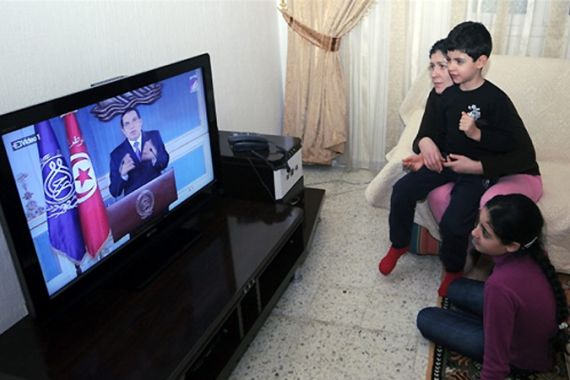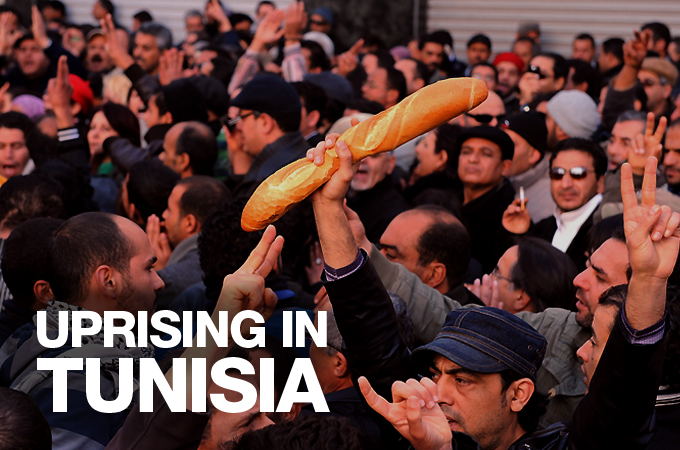Tunisia president not to run again
In bid to placate protesters, Zine El Abidine Ben Ali vows to broaden political freedoms and allow freedom of speech.

 |
| A nightly dusk-to-dawn curfew is being imposed in the capital Tunis [EPA] |
The Tunisian president has announced in a televised address he will not seek a new term in office.
The announcement by Zine El Abidine Ben Ali, who has been in power since 1987, came amid violent protests across the country over unemployement and rising food prices.
He said he will not seek re-election when his presidency comes to an end in 2014.
“I understand the Tunisians, I understand their demands. I am sad about what is happening now after 50 years of service to the country, military service, all the different posts, 23 years of the presidency,” Ben Ali said.
Ben Ali ordered reduction in the prices of bread, milk and sugar, and also instructed security forces to stop using firearms against protesters in his speech on Thursday evening.
“Enough firing of real bullets,” he said. “I refuse to see new victims fall.”
Deadly shootings
Yet despite the president’s announcement that live ammunition would not be used, Al Jazeera learned that three more people were killed in Aouina, a suburb of Tunis – less than an hour after the president’s speech.
“I couldn’t understand because the president just said that they’d stop using live ammunition, but they still shooting people,” the witness told Al Jazeera.
 |
| See Al Jazeera’s complete coverage |
Earlier, two young men were killed in clashes with police in the town of Sliman, according to witnesses, bringing the number of dead in the past two days to at least 16 people.
Those killed included three people in the town of Menzel Bourguiba, one person in Bizerte and one in Tataouine.
A woman with dual Swiss-Tunisian nationality was reportedly shot in the throat by police during a demonstration in the town of Dar Chaabane on Wednesday, the Swiss foreign ministry announced.
Police killed another four people in the southern town of Douz, according to the Reuters news agency.
The International Federation of Human Rights Leagues (FIDH) said earlier on Thursday that it has tallied 66 confirmed deaths since the protests began on December 17.
The death toll includes seven people who committed suicide in protest over unemployment and economic hardships. The rest were reportedly killed by the Tunisian security forces.
French and Swiss citizens visiting their native country were among those killed, the two European governments said.
Opposition surprise
Najib Chebbi, Tunisia’s main opposition leader, welcomed what he described as an unexpected decision by the president to step down in 2014 and introduce a raft of measures to ease tensions in the country.
“This speech is important politically and corresponds to the expectations of civil society and the opposition,” the founder of the PDP party, told the Reuters news agency.
“This is something we have asked for for a long time and it is very good that he has promised not to put himself forward for the election.”
“The president has touched on the heart of the issue, demands for reform. That is very important and I salute that,” Chebbi said.
“But what remains is how will this be carried out and I ask that a coalition of government be created.”
Activists were also positive about the far-reaching political changes which the president promised.
Rafik Ouerchefani, a supporter of the centre-left Ettajdid party, told Al Jazeera that he was sceptical over whether the president’s promises would be delivered.
“I am happy with the speech, but let’s not forget the dead,” he said.
He said he was relieved that Ben Ali will not be standing down immediately, as time was needed for the country to prepare for a genuinely democratic election.
After decades of being stifled, he said opposition parties must work to prepare candidates capable of taking over the role of president.
“This is already a major victory, now we must work towards the alternative: what happens post-Ben Ali,” he said.
‘Unprecedented’
A Tunisian activist told Al Jazeera, speaking from Tunis under condition of anonymity, that the speech “shows definitely a major shift in Tunisia’s history”.
“Ben Ali talked for the third time in the past month to the people. Something unprecedented, we barely knew this guy,” he said.
It was noteworthy that, for the first time on Thursday, Ben Ali spoke in the Tunisian dialect instead of Arabic, he added.
“He spoke directly to the police forces and ordered them not to shoot, unless in cases of self-defence. On the same line he said a commission will investigate in the murders that occurred,” he said.
Ben Ali promised broader political freedoms, including the formation of a political party and that all censorship of the internet and traditional media would be halted.
“People are still cautious and doubt these words,” the activist said. “Turning his words into action will be a very difficult mission.”